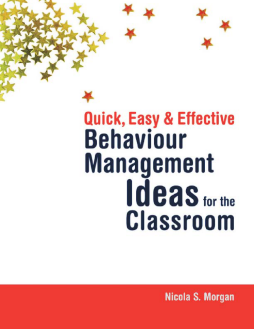
Additional Information
Book Details
Abstract
Every teacher knows that the foundation of a good learning environment is effective behaviour management. Without the right attitude, resources and techniques, behaviour problems can disrupt classes, consume the teacher's time and subsequently affect the education and well-being of all the children. This book is brimming with quick, easy and effective techniques to help keep children focused on their work and engaged in appropriate behaviour within the classroom.
Based on Nicola S.Morgan's years of experience teaching and managing a range of challenging behaviours in the classroom, the book provides practical and do-able strategies that work and includes worksheets, rewards and other fully photocopiable resources. The ideas are all based around an original framework developed by the author called The 10 Rs for Behaviour Management. T he 10 Rs is a term for a group of strategies that are efficient 'tried and tested' techniques for managing children in the classroom, no matter what the behavioural difficulties are. They aim to prevent the occurrence of behaviour difficulties, or if problems do occur, they show how to quickly re-establish appropriate behaviour.
The behavior management ideas and resources in this book will provide invaluable practical support for teachers, learning support assistants, teaching assistants and trainee teachers.
Nicola S. Morgan qualified as a teacher in 1995 from the University of Wales Institute in Cardiff, South Wales. During her thirteen years of experience as a qualified teacher she has taught in a range of settings, including mainstream and special needs schools. Nicola has worked both as a permanent member of staff and also as a supply teacher. She has developed a reputation for managing the most difficult classes and she is regularly sought after for her knowledge and skills in this area. This is Nicola's second book for teachers . She also develops and runs training courses on managing children within the classroom environment.
Table of Contents
| Section Title | Page | Action | Price |
|---|---|---|---|
| 1. Introduction | |||
| 2. Considerations around WASH and the nexus | |||
| 3. Country case studies from the field | |||
| 4. The role of non-household settings | |||
| 5. Moving forward: bridging the divide |
